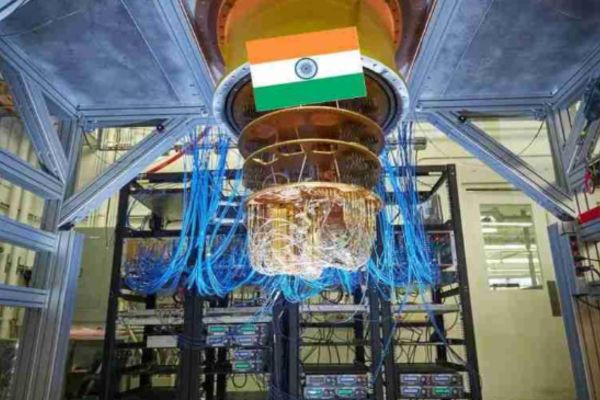Basically, quantum computing is progressing very quickly in last few decades. Quantum computers work on the principle of quantum mechanics like entanglement, superposition, interference to process, store and manipulate large amounts of data and perform complex calculations for conventional computing systems. If you are from the field of physics, computer science, or mathematics you can go ahead with the research of quantum computers. To do or continue your research in the field minimum knowledge of python, basic mathematics and some quantum mechanics calculations is required. Quantum computers differs from classical computers in so many perspectives for e.g., quantum computers are much faster than classical computers in solving problems and can solve complex problems too which are the limitations of classical computers. By today, world is going too fast to make quantum computers true. Work has been done so promisingly in the field that qubits are arranged to work in the proper way at the absolute zero temperature with other qubits giving effect on each other but today too the problem is with noise and major of the world is going with this to somehow stop this effect so we can exact results as theoretical ones. Many companies around the globe like IBM, GOOGLE, MICROSOFT and many more had designed their quantum computers and many people around the world are accessing in them through the cloud. But the most rapid, the fastest and the efficient quantum computer is with IBM. Across the globe research going and the efficient coding is going with IBM’s quantum computer and all the people in the world who are connected with the field are accessing quantum computers through the IBM’s quantum cloud on the site of IBM.
India’s Quantum Journey
India is a country with the population of more than 1/8th of the world’s population. India is generating millions of engineers, scientists, programmers, etc. who can work in the field of quantum computing. Russia and china are the fastest going ahead countries in the field of quantum computing with USA. But due to the lack of people they are till behind as then need some more indian minds and they are offering us to be in the field. Recently, the Eurasian Times is reporting that India one of the BRICS (Brazil, Russia, India, China and South Africa) was invited to join the quantum communications project. This partnership will benefit the China-Russia project greatly. While this invite appears to be rejected by India because of suspicions about China. In the rapidly evolving world of quantum computing, more and deeper partnerships and collaborations with India would not just beneficial, it will be imperative. India stands out as a critical partner for the western quantum ecosystem. India’s strategic position in the global quantum community seems ignored. For western countries, partnering with India in quantum computing could be not just a technological collaboration but a geopolitical strategy.
India’s greatest asset in the quantum journey is its talent. The country has a vast reservoir of young, talented and highly skilled professionals in STEM fields. Indian universities and research institutions are giving out world class scientists, engineers and programmers. By integrating this talent pool into the western quantum ecosystem, there is an opportunity to accelerate innovation and development. India has been making strides in quantum computing and related technologies. The Indian government’s significance investments in quantum research under initiatives like the “National Mission on Quantum Technologies and Applications (NM-QTA) reflect a commitment to this field. It’s likely that India would have access to commercial opportunities in the west that they would not have in a Russia-China partnership.
Pioneers and Trailblazers
When it comes to quantum strengths, India offers a solid and innovative research output and entrepreneurship in many areas of the quantum industry. Here are few scientists who are working on quantum computation in India;
- About 20 or more members from HRI, Allahabad are working on the field.
- Prof. Shaji of Datta/Shaji/Caves fame in IISER Thiruvanathapuram
- Prof. Home and Bose in Bose Institute Kolkata
- Prof. Arvind in IISER Mohali.
- Prof. Guruprasad Kar, Indian Statistical Institute has worked on quantum entanglement.
- Dr. Pankaj Aggarwal, Institute of Physics, Bhubaneshwar works on quantum information and correlation.
Many more are there like Jaypee Institute of Information and Technology, Calcutta University, S.N. Bose Institute, etc. are working rapidly in the field of quantum computing to make India as well a remarkable country in the field as this field is the most rapidly growing research field in the world.
Quantum Computing in India Today
One of the major initiatives is the Quantum Computing Applications Lab (QCAL), which was launched by the Ministry of Electronics and Information and Technology in collaboration with AWS. QCAL aims to accelerate the adoption of quantum computing in India by providing access to quantum computers, tools and resources to researchers and developers. The Indian Institute of technology, Mandi, is developing a first of its kind indigenous room temperature quantum computer that will use photons for faster calculations according to officials. The computer being developed as part of the national quantum mission, will be unique in its ability to analyse data and suggest solution with 86 percent accuracy with traditional algorithms, they said. Quantum computing is a rapidly emerging technology that harnesses the laws of quantum mechanics to solve problems too complex for classical computers. They said they are constructing a room temperature optical quantum computer capable of solving feature learning and classification problems instantly. A quantum computing centre at the Indian Institute of Science in Bangalore focusses on quantum algorithms, quantum information theory and quantum error correction. Quantum computing mission of India is with Rs.6003 Cr budget.
Applications and Impact
Some of the potential uses of quantum computing are:
Cryptography: Quantum computing can potentially break many of the current cryptographic algorithms used to secure communications and transactions. However, they could also be used to develop new quantum-resistant encryption methods that would be more secure
Optimization Problems: Many real-world problems involve finding the optimal solution from a large number of possible solutions. Quantum computing can be used to solve these optimization problems more efficiently than classical computers, enabling faster and more accurate solutions.
Material Science: Quantum computing can simulate the behaviour of complex materials at a molecular level, enabling the discovery of new materials with desirable properties such as superconductivity or better energy storage.
Machine Learning: Quantum computing can potentially improve machine learning algorithms by enabling the efficient processing of large amounts of data.
Chemistry: Quantum computing can simulate chemical reactions and the behaviour of molecules at a quantum level, which can help to design more effective medical drugs and materials.
While these are just few examples, the potential applications of quantum computing are vast and varied. However, the technology is still in its early stages and many challenges need to be overcome before it can be widely adopted for practical applications.
Challenges
There are so many challenges, Indian scientists and people connected to quantum computing are facing, these are listed as below:
Qubit’s short life span: Decoherence is the process where qubits become entangled with their environment, leading to the loss of the delicate quantum properties used in quantum computing.
Current lack of scalability: Quantum computers require specialized techniques and materials, which face challenges around fabrication precision, materials quality and minimizing effects.
Demand for highly complex hardware: Quantum computing requires highly specialized computer hardware to successfully build qubits. The challenge here is that there aren’t enough physical resources to quickly manufacture high quality, quantum ready components for enterprise usage at a reasonable cost.
Inadequate availability of software: You don’t need to be quantum physicist to write programs for quantum computers. But there’s a considerable lack of available software for quantum computing systems.
Limited scope for strategic implementation: Organizations must have a tactical roadmap before adopting quantum computers for the enterprise.
Few workers with quantum skills: The task of finding potential employees with specific skills in quantum computing remains a key issue.
Opportunities
Along with challenges, there are so many opportunities also in the field of research in quantum computing. The diverse range of jobs in quantum computing includes:
Quantum optics Scientist: Experts in developing and manipulate quantum optics for quantum information processing.
Quantum communication engineer: Specialists in quantum communication technologies, such as quantum key distribution.
Quantum Research Associate: Researchers who conduct experiments and contribute to advancing quantum computing technology.
Quantum Analyst: Analysts who study the potential impact of quantum computing on various industries.
Conclusion
As there are a lot of potential applications and so many opportunities in the field of quantum computing and communications as discussed earlier. A particular can work on his programming and some concepts to make an impact in the field. As being an Indian researcher, I want my countrymen to motivate themselves to work in the field and make India a leader in the quantum communications. We are 1/8th of the population of world, together we can make this quantum communication true. Government of India has invested Rs. 6003 Cr in the particular field so India can have its own quantum computer in several years. the field of quantum computation has a vast field in it like quantum error correction, quantum algorithms, quantum entanglement and if I talk in a brief quantum teleportation or the real teleportation could be made true by the help of quantum computers till now it has been possible for some photons but one day real teleportation could be true, now thing is who will be the one who will made it true. Science fiction can be made true with the help of quantum computers if we really work well and make India a prospect leader in the field.













